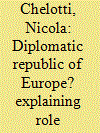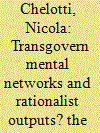| Srl | Item |
| 1 |
ID:
139837


|
|
|
|
|
| Summary/Abstract |
Using an original database of 138 questionnaires, the article explores how national officials perceive their role when participating in European Union (EU) foreign policy committees. It first shows that they systematically assume not only intergovernmental but also supranational role conceptions: a good number of diplomats understand EU foreign policy as a collective political project with the objective to craft a common European policy. The article then investigates some scope conditions. If the overall picture is complex and heterogeneous, it reveals that socializing activities occur in this policy field. More specifically, the number of years spent in Brussels is a relatively strong predictor of a supranational attitude. At the same time, diplomats’ conceptions are formed also outside EU contexts: the structure and the pro-European opinions of the national polity affect the formation of a diplomat’s orientation. Remarkably, member states’ military power is a weak and non-significant variable in all the models tested.
|
|
|
|
|
|
|
|
|
|
|
|
|
|
|
|
| 2 |
ID:
148319


|
|
|
|
|
| Summary/Abstract |
The European Union (EU) foreign policy has gone beyond intergovernmentalism. It is largely formulated by (Brussels-based) national officials, in a process characterised by a high number of cooperative practices, diffuse sentiments of group loyalty and possibly argumentative procedures. Yet, in many cases, the most likely output of this process reflects the lowest common denominator of states’ positions or the preferences of the biggest states. The article intends to investigate this puzzle. In the first part, it corroborates its existence by using answers from an original database of 138 questionnaires and 37 interviews with EU negotiators. Next, it argues that cooperative practices remain often subordinated to nationally oriented ways of doing things. Consequentialist practices perform an anchoring function, in that they define the parameters around which (social) practices operate. The last section looks more closely at the sites of and meanings attached to EU foreign policy-making. By discussing national diplomats’ conspicuous leeway in Brussels, it also argues that negotiating practices are performed through a mix of partial agency and persistence of national dispositions. On the whole, changing practices is difficult, even in dense and largely autonomous settings such as EU foreign policy. The social construction of EU foreign policy occurs only to a partial extent.
|
|
|
|
|
|
|
|
|
|
|
|
|
|
|
|